What can you use instead of mirin? 12 best substitutes
If you like to cook Japanese dishes, then you’ve likely come across an ingredient called mirin.
What is mirin?
Well, do you love teriyaki? Then, chances are, you’ve had mirin before, as it’s an essential ingredient in the sauce!
It’s actually a rice wine with a sweet and tangy flavor. It’s a must-have pantry staple, which contributes to that umami richness of many Asian dishes.
But what if you can’t find mirin? Don’t worry; several tasty substitutes give a similar rich umami flavor with a hint of tanginess and sweetness.
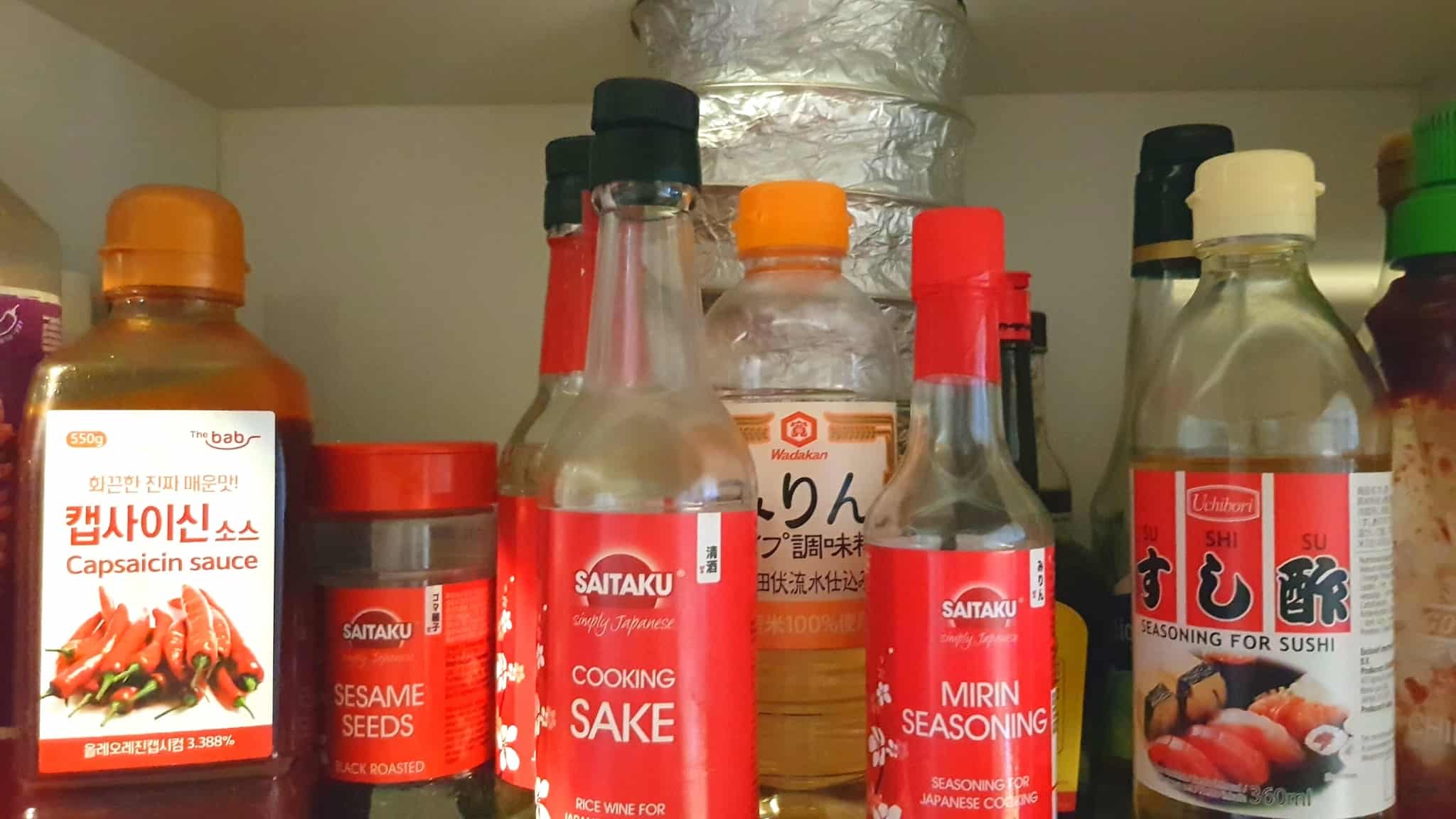
The best alternatives to mirin are alcohol-based drinks like rice vinegar, dry white wine, or sake, which must be combined with about a ¼ teaspoon of sugar to counteract the sourness and acidity of the alcohol.
Read on to learn more about mirin, what to look for when you need a substitute for mirin, and to see how to prepare mirin alternatives.
Or check out the video I made on the topic, full of inspiring dishes and imagery on how to substitute mirin in your recipes:

Check out our new cookbook
Bitemybun's family recipes with complete meal planner and recipe guide.
Try it out for free with Kindle Unlimited:
Read for freeIn this post we'll cover:
Using mirin in your dishes
During cooking, the alcohol evaporates from the sauce, leaving only its sweet taste.
Mirin is, incidentally, only intended for cooking (not for drinking), and the texture is viscous and it has the color of amber.
Due to its sweet taste, mirin combines well with more salty sauces, such as soy sauce. Together, they form the base for a traditional teriyaki sauce, for example.
Mirin combines well with both meat and fish, but also with vegetables or tofu.
Pay attention to the quantity you use though! A little bit can be enough because of the somewhat bold taste.
Mirin is very suitable as a basis for marinades and dressings. You can use it for a teriyaki sauce, but also as a marinade with salmon or sea bass.
Thanks to the high percentage of sugar, any sauce you make with it will leave a nice glossy layer.
Some of the best recipes that use mirin are:
- Delicious sauce for yakitori
- Guide to sukiyaki steak | recipe, cutting technique and flavors
- Learn to make this TenDon “tempura donburi” recipe
Why substitute mirin?
Mirin isn’t always easy to find.
The real thing, called “hon mirin,” is much harder to find than “aji mirin” (even in Asian grocery stores), which is made with extra sweeteners.
Kikkoman has a good aji mirin:

But you can use the substitutes below if you can’t get ahold of it.
You might also be looking for an alcohol-free alternative if you’re avoiding it, and below is an option for you if you need to go that route.
For more alcohol-free mirin options, check out my post here.
What makes a good substitute for mirin?

Mirin has a sugar content of up to 45%, so any kind of substitute or alternative must have a high sugar content.
The goal is to find something with both acidic and sweet properties. Mirin substitutes are made by combining alcohol and sugar.
While you can’t imitate the exact flavor of mirin, there are several ingredients you can combine to create similar flavors for your dishes.
12 best mirin substitutes
These substitutes work very well in teriyaki sauce, Asian-style stir-fries, soy marinades, and ramen. They’re also great substitutes as a glaze for beef, chicken, and seafood.
Some people also love to use these substitutes to make a sauce for vegan sushi (sans honey).
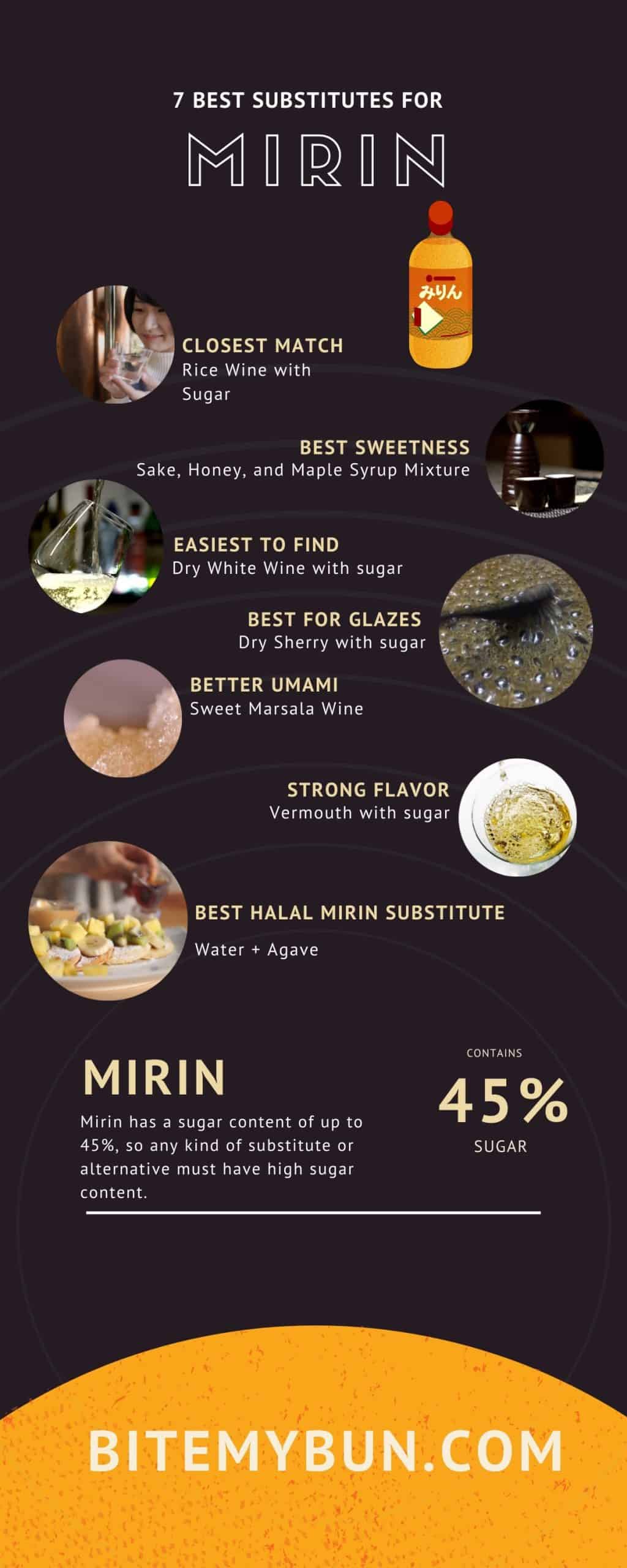
Closest match: Japanese rice wine with sugar
Japanese rice wine is the perfect mirin substitute because it also has fermented rice as the base flavor.
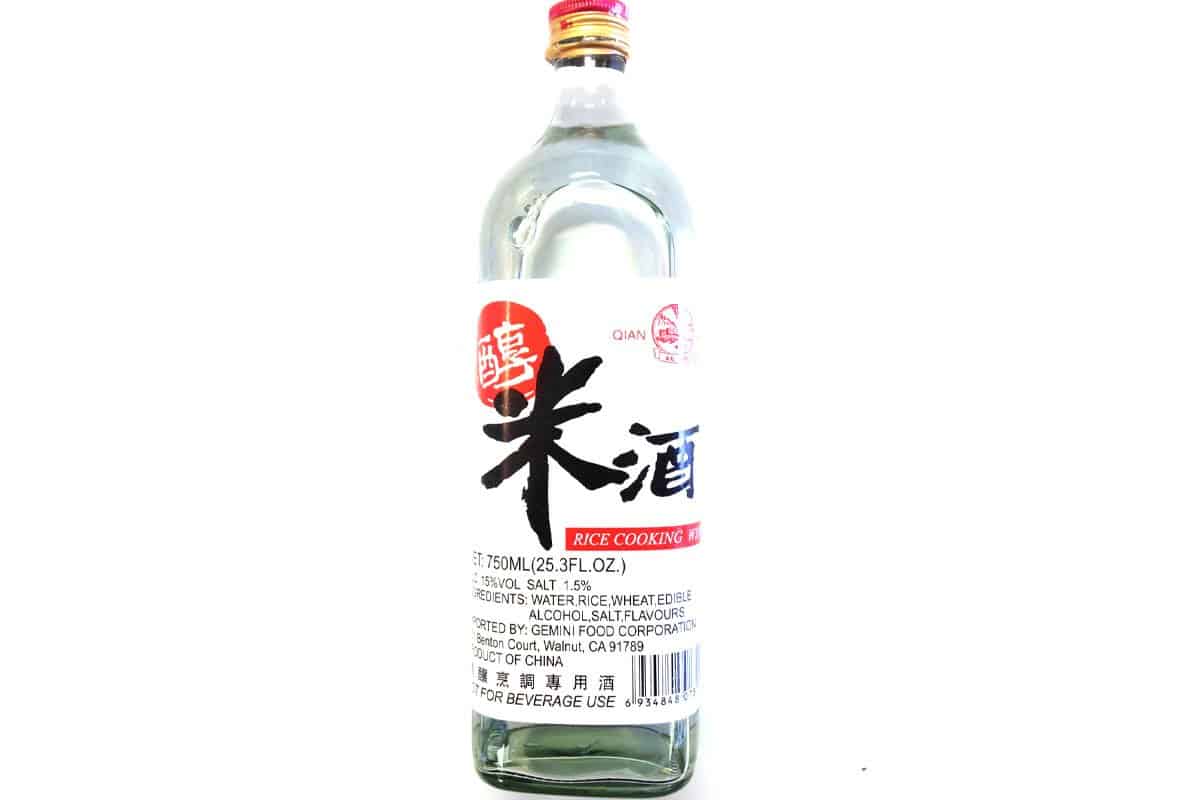
However, rice wine is very sour, so to counteract the sour taste, you need to add sugar. All you have to do is add 1 tablespoon of sugar to every ½ tablespoon of rice wine.
Since this combination has a very similar flavor to mirin, you can use it for all types of dishes. You can use it to make a dipping sauce for sushi, as a marinade for fish, and as a condiment for noodles.
Best sweetness: sake, honey, and maple syrup mixture
This substitute sauce is all about bringing out that sweetness.
All you have to do is mix sake with honey and maple syrup in a 5 to 1 ratio.
This means the second quantity is 5 times larger than the first. You need a bit of sake and lots of honey and maple syrup.
You then need to boil the ingredients until the mixture is reduced by half.
As the best mirin substitute, this mixture has a thick syrup-like texture and consistency, so you can use it in all dishes that require mirin.
Use it as a glaze for meats and vegetables, and even as a sauce in noodle dishes.
Looking for good sake to cook with? I’ve listed the best cooking sake + Differences with drinkable sake & buying tips here.
Easiest to find: dry white wine
Take ¼ cup of dry white wine and add about ¼ or even ⅓ teaspoon of white sugar.
The sugar balances out the acidity of the dry wine and gives a very umami type flavor. So white wine is a good mirin substitute.
The high alcohol content of white wine is ideal for cooking meats.
Since the alcohol evaporates during the cooking process, use the wine + sugar combo to make teriyaki sauces, marinades, and meat glazes.
Best for glazes: dry sherry
Sherry is an alcoholic beverage originally from Spain. It’s a white wine with brandy or a neutral distilled spirit.
This fortified wine is used when making sauces and glazes, and cooking meats like pork and poultry.
It has a flavor similar to rice wine, so when combined with ¼ teaspoon sugar, it’s a good substitute for mirin.
Use dry sherry for cooking meat, especially beef and poultry. It makes the meat very tender and adds a hint of sweetness.
You can also use it in teriyaki and soy sauce to flavor your favorite Japanese cooking.
Better umami: sweet Marsala wine
Sweet Marsala is a fortified wine, similar to dry sherry. It contains brandy or other distilled spirits and has a sweet flavor.
It’s a good mirin substitute because it has both acidic and sweet properties, and gives a bit of umami flavor.
To make it taste like mirin, add ¼ teaspoon sugar to your sweet wine.
You can use sweet Marsala wine in all the recipes that call for mirin.
It works well with soba noodles, as part of a glaze for beef, and it can also replace mirin in Japanese salad.
Strong flavor: vermouth
If you haven’t heard of vermouth, it’s an aromatized fortified wine. Usually, it has a botanical aroma and sweetness.
Just like the other alcohol mirin substitutes, you can add ¼ teaspoon sugar to ¼ cup of this drink and use it instead of mirin.
Vermouth works well when cooking meats, but it has a stronger flavor than you’d expect, so use it sparingly for sauces.
Avoid using vermouth in ramen because it’s not going to give that classic taste you’re looking for.
Best halal mirin substitute: water + agave
Not a fan of alcohol? If you want to cook without any alcohol (maybe for halal purposes) but still want a similar flavor to mirin, you can always use a mixture of water and agave syrup.
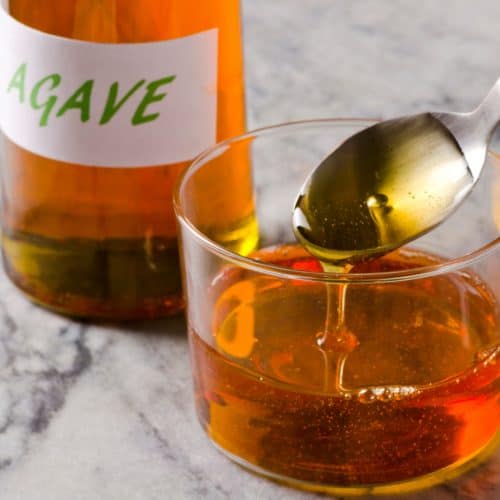
Best halal mirin substitute: water + agave
Ingredients
- ⅓ tbsp agave syrup
- 1 tbsp water
Instructions
- You need to use a ratio of 3:1 water and agave syrup. This gives a similar syrupy texture as mirin, but the flavor is less like mirin.
Nutrition
Mirin and alcohol
The best substitute for mirin is alcohol-free mirin called mizkan honteri mirin. This Japanese bottled seasoning has basically the same flavor as regular mirin, with the same amount of sweetness. It can be used in all recipes where mirin is required, and you’ll get the same results.
Check out my top pick for the ultimate best alcohol-free mirin. Then, I’m listing some substitutes for this alcohol-free mirin which have a similar flavor profile.
Does all mirin have alcohol?
No, not all mirin has alcohol. Although it is intended to have alcohol, some brands have taken it upon themselves to create a non-alcoholic version to cook with to cater to those who can’t or don’t want to use it, even though it evaporates if cooked properly.
Best alcohol-free mirin to buy: Mizkan Honteri
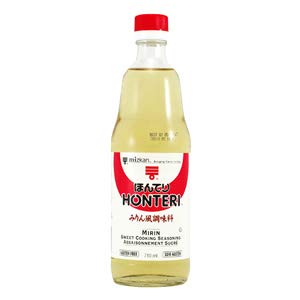
Have you been searching for an alcohol-free alternative for mirin?
I’ve got good news. There’s a really good one available, and it’ll surely become a new pantry staple seasoning!
Alcohol-free mirin is called honteri, and it has almost identical flavors to regular rice mirin. It infuses your food with a distinctly sweet flavor.
Honteri works well in teriyaki, sukiyaki, and as a marinade for meat and seafood.
In addition, you can substitute it for regular mirin in all recipes like soups, stocks, sauces, noodles, and stir-fries.
You can also use alcohol-free mirin to tone down fishiness and the strong flavors in game meat and beef.
It’s a truly versatile ingredient, but even people who don’t cook with or drink alcohol can enjoy its sweet umami flavor.
Non-alcoholic mirin vs mirin with alcohol
The flavor of this sweet seasoning is almost identical to regular mirin. Just like mirin, it meshes well with salty sauces like soy and tamari.
But some types of mirin substitutes contain a lot of corn, so you can liken the taste to corn syrup and even maple syrup.
Poor quality mirin substitutes will also taste a lot like artificial sweeteners. I wouldn’t use them if I’m trying to make an expensive recipe with costly meat or seafood.
The one thing to take away is that alcohol-free or low-alcohol mirin substitutes are similar in flavor but don’t have that distinct tanginess that comes with alcohol.
You can use them as seasonings for all kinds of recipes, and you’ll achieve a similar flavor.
Best alcohol-free mirin substitutes
If you’re not interested in Honteri or simply cannot find it, other alcohol-free mirin substitutes are available.
White grape juice
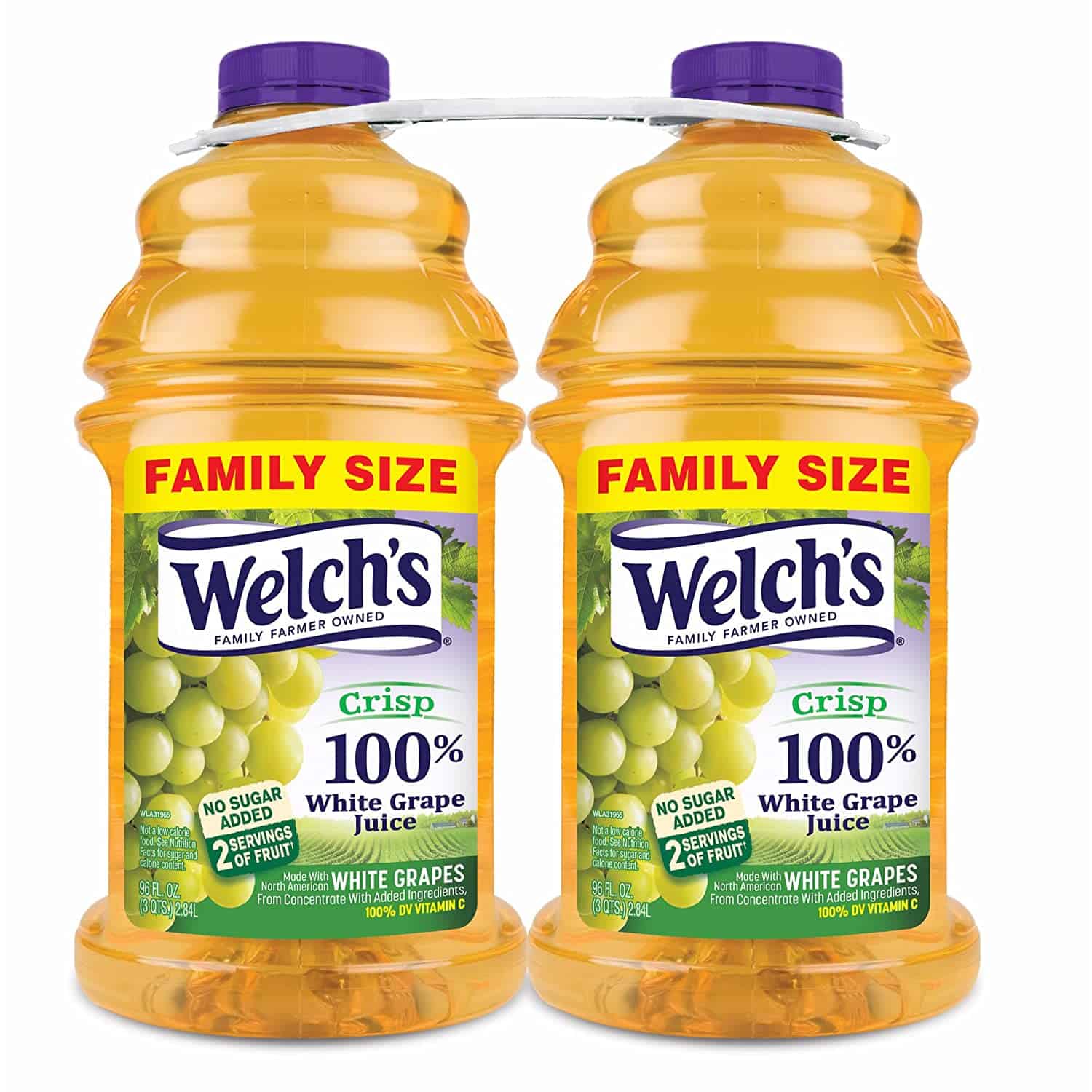
This is probably the cheapest non-alcoholic mirin substitute. White grape juice is readily available at all supermarkets.
I recommend a brand like Welch’s because it doesn’t contain added sugars, but is sweet enough to mimic the flavor of mirin.
As well, grape juice is acidic and works just like mirin to tenderize meats.
White grape juice has similar flavor notes to wine, yet it’s a juice and is alcohol-free. I don’t recommend red grape juice because it has a dark color and mirin is a light yellow color.
So white grape juice is the overall best substitute for mirin.
If you want to make white grape juice a bit sour to mimic mirin’s flavor even more, you can add a splash of lemon juice. I recommend this grape juice and lemon combo whenever you’re cooking red meats like beef and game.
Looking for a mirin substitute WITH alcohol? I discuss some really good options here.
Apple juice
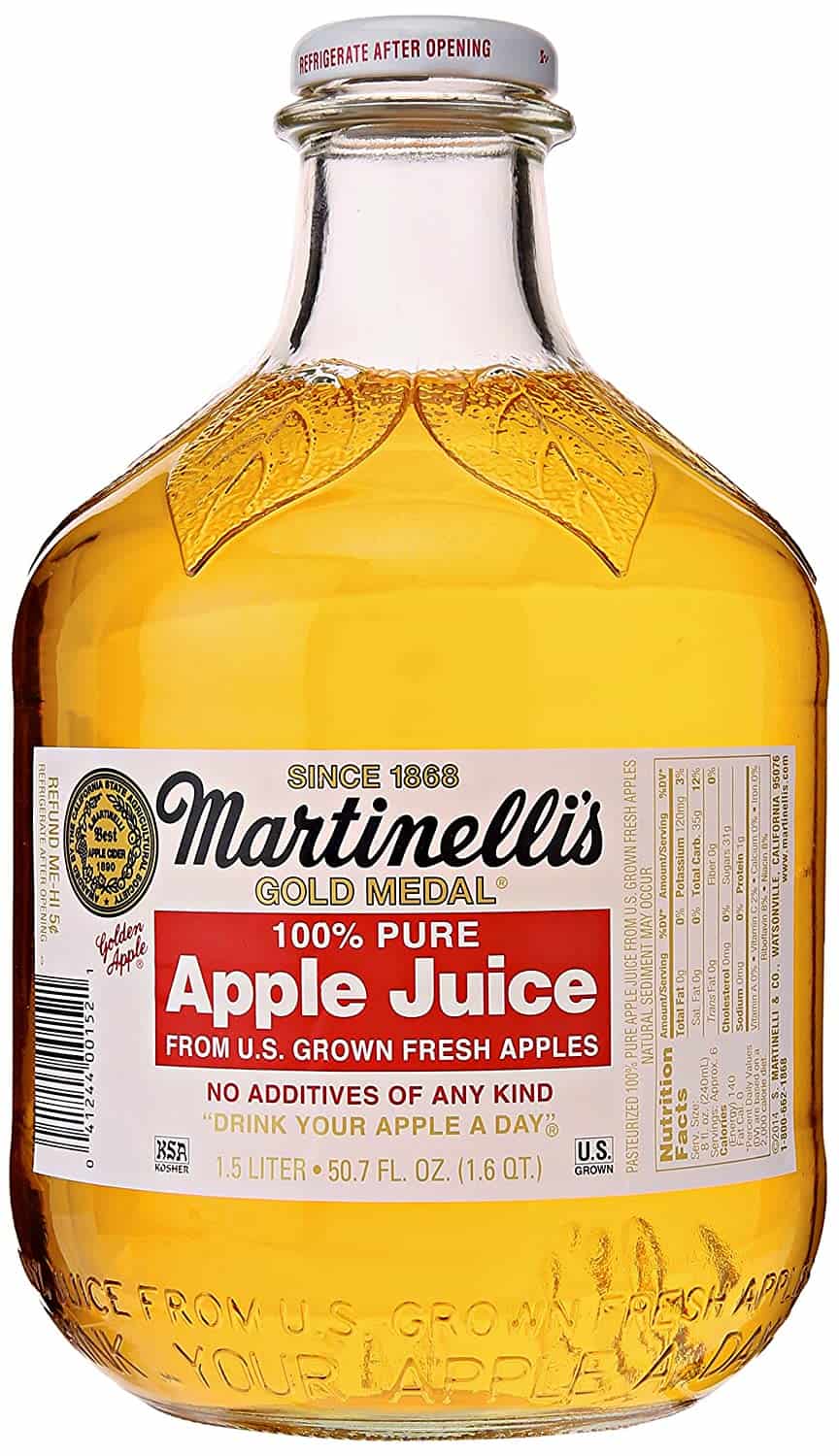
High-quality organic apple juice with few or no preservatives is a very good substitute for alcohol-free mirin.
Apple juice has a similar acidity to grape juice and the same sweetness. You can use them both interchangeably when you run out of alcohol-free mirin.
Mirin has a certain tanginess to it, and apple juice has this too, especially if you buy one without a lot of added sugar.
Kikkoman Kotterin mirin
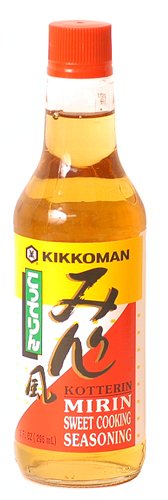
Kotterin mirin is a sweet syrup with similar characteristics to mirin.
It’s labeled as a sweet cooking seasoning and is made from corn syrup, vinegar, and fermented rice. Luckily, this seasoning is alcohol-free.
I wouldn’t go as far as labeling it a type of authentic mirin, but it can be used in all kinds of foods, especially teriyaki and sukiyaki.
It’s very sweet and full of sugar, but it gives food a pleasant flavor, so it’s a great alcohol-free mirin substitute.
The key to making this product work as a substitute is to use only a small amount.
Use less than you would with mirin because it does have that artificial sweetener type of flavor. You don’t want to make the food overly sweet.
Kikkoman seasoned rice vinegar
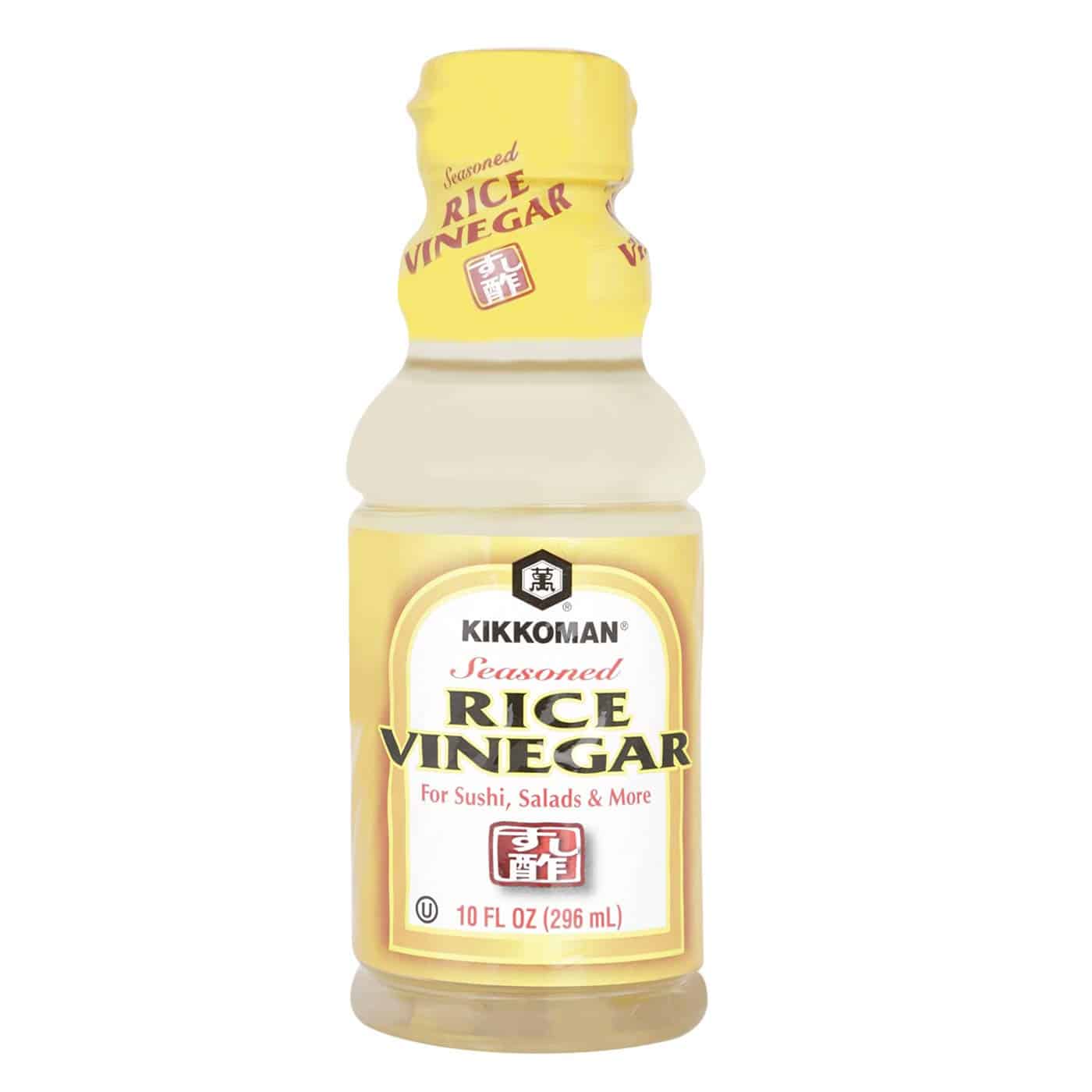
Rice vinegar is a great alcohol-free mirin substitute.
It’s much sourer in flavor, so you have to counteract this sourness with extra sugar. As a general rule, you can add about ½ teaspoon sugar for every tablespoon of rice vinegar you use.
Mirin is made up of about 30% or more sugar, so if you want to achieve that sweet rice taste, you must add the sugar.
Like all vinegar types, rice vinegar has a sour and acidic taste. You’ll find this vinegar labeled as rice vinegar or rice wine vinegar, but they refer to the same non-alcoholic product.
It’s made out of fermented rice vinegar and has a clear yellow color.
If you want to use it as a mirin substitute, you’ll be glad to know it works very well in dressings, dipping sauces, and marinades when it’s combined with brown or white sugar.
Check out Kikkoman rice vinegar on Amazon
Low-alcohol option: Aji mirin seasoning
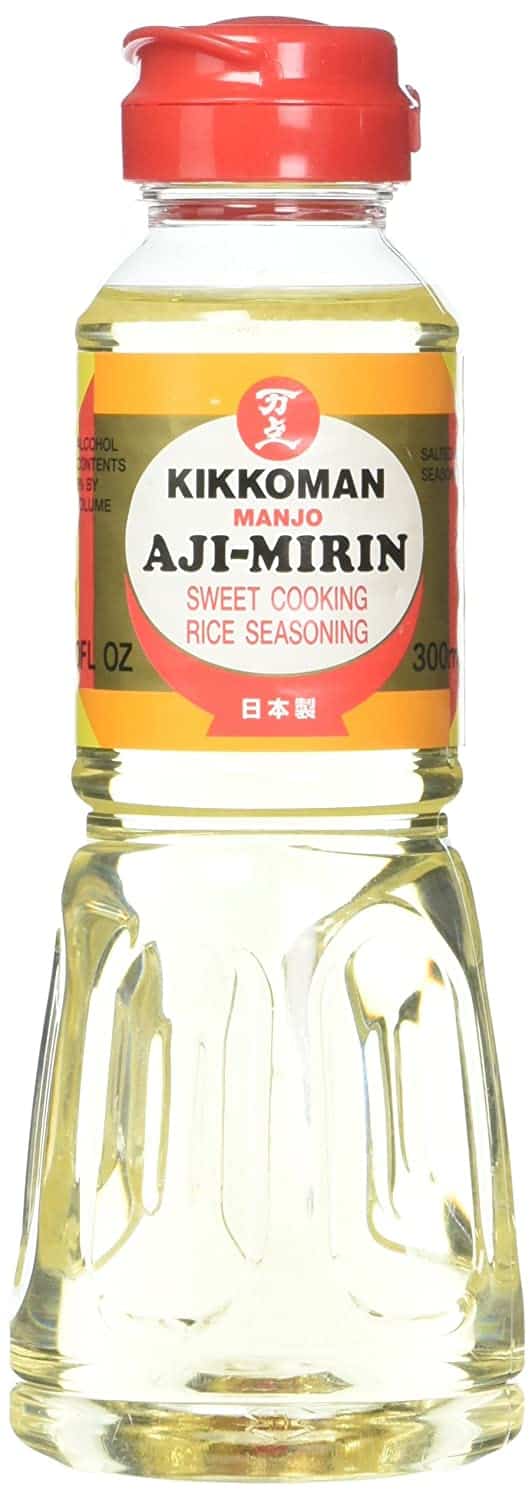
Aji mirin isn’t considered real mirin. It’s a sweet syrup-based seasoning liquid that sweetens your food like mirin, but without alcohol.
Most aji mirin contains high-fructose corn syrup or sugar, salt, and monosodium glutamate. It’s not the healthiest seasoning, but it does infuse foods with that Japanese-style sweetness.
Aji mirin is not a cooking wine because it’s not manufactured in the same way. Instead, it’s more of a cooking wine type of seasoning.
Watch out when you buy aji mirin because many varieties, including the Kikkoman one, contain a small quantity of alcohol. It’s not noticeable, and grocery shops still sell it because it’s not considered an “alcoholic seasoning.”
So you can basically consider it alcohol-free because the alcohol in there is close to nonexistent.
Make tasty dishes with mirin
The next time you come across a recipe that requires mirin, feel free to use rice, white, or Marsala wine, or a sweet syrup, honey, or alcohol and sugar mixture.
While you may not achieve that exact umami flavor, these substitutes come close enough!
Mirin without alcohol isn’t quite the same as the real thing. But you can confidently use these alcohol-free mirin substitutes for delicious Japanese cooking.
They all have a similar sweet syrupy flavor, and it pairs perfectly with salty sauces, especially soy.
There’s no reason not to give fruit juices or Kikkoman mirin seasonings a try the next time you’re looking to replace alcoholic mirin.
I’m sure you’ll appreciate the delightful taste, and the good thing is, you only need to use a small amount because it goes a long way!
Read next: Sake & cooking sake vs mirin | Differences with drinkable sake & buying tips
Check out our new cookbook
Bitemybun's family recipes with complete meal planner and recipe guide.
Try it out for free with Kindle Unlimited:
Read for freeJoost Nusselder, the founder of Bite My Bun is a content marketer, dad and loves trying out new food with Japanese food at the heart of his passion, and together with his team he's been creating in-depth blog articles since 2016 to help loyal readers with recipes and cooking tips.
